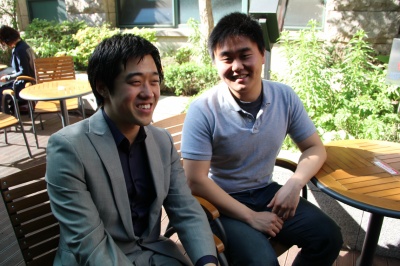
Omni-Box is a combination of the words omni, which has a double meaning of “mother” in Korean and “everything” in the English prefix and box. The name indicates Omni-Box’s main goal of finding necessary goods for single households’ living. It was first founded by four university students: Jeong Ju-hyeong (Yonsei University, 4), Lee Jung-yoon (Yonsei University, 4), Lim Jong-yoon (Yonsei University, 4) and Song Dong-min (Seoul National University of Science & Technology, 4) on April 1. It all started to take place when the idea of delivering home food for single households came to their heads.
“We all have had experiences living alone and the most serious problem was with the difficulties eating at home,” said Jeong, the founder of Omni-Box. “We would naturally reach out for instant food, which made us gain weight and become less healthy. Therefore, we thought that providing homemade food could improve the lives of single households.”
To make sure that customers receive the best quality food in low prices, which are lower by 60 percent compared to the original price, the members carefully chose the food supply shop. Instead of large stores, Omni-Box turned their heads toward traditional markets, where food is in high quality and its taste is close to that of home.
“If we receive food supplies from big markets, Omni-Box will not be any different from other ordinary delivery services,” said Lee, the manager of Omni-Box. “The value of traditional markets is easily overlooked, but in fact, the products are in higher quality and the sellers take pride in them as most are self-made.”
Omni-Box provides both university students and traditional markets a chance to encounter each other by working as a bridge between the two. Customers may order the food box through the official Web site and Omni-Box delivers the orders to certain markets so that they can prepare the dishes. The kinds of side dish change every month so that people can have a variety of food without cloying.
Even though Omni-Box has now gained popularity among single households, the process has never been easy for the members. As there are not so many successful youth entrepreneurs, it was difficult to find someone to ask for advice whenever trouble arose.
“We did everything on our own, starting from setting up the homepage to seeking effective marketing strategies,” Lee said.
The members put extra effort and time to overcome those limitations, which made them concentrate more on their business. Moreover, contemplating such problems and issues for a long time helped the members become more passionate.
Omni-Box is also significant in that it is the epitome of university students’ start up business, in which students themselves successfully developed their own ideas and put them into action. Instead of choosing to find jobs in renowned companies, the members focused more on gaining real-world experiences by starting business on their own.
“It may have been easier for me to apply for famous corporations, which is the ideal path that most university students dream of,” Jeong said. “However, my perspective would have been much narrower. Being the head of the business and starting from the bottom is a totally different thing. I was able to gain a broader outlook toward the real-world business.”
It has only been two months since its foundation, but Omni-Box plans to further enlarge its business to fulfill necessary goods for single households, not limiting their business to food.
Omni-Box advises university students not to limit themselves but to accept their weaknesses and emphasize their strength at the same time.
“Do not limit yourself to certain pathways,” Lee said. “Since most of us will live for more than 60 years, one or two years of failure will not ruin your entire life. Be bold and try to overcome stereotypes; this will make you a successful entrepreneur in the future.”
Chung Che-yoon
thfl353@ewhain.net

